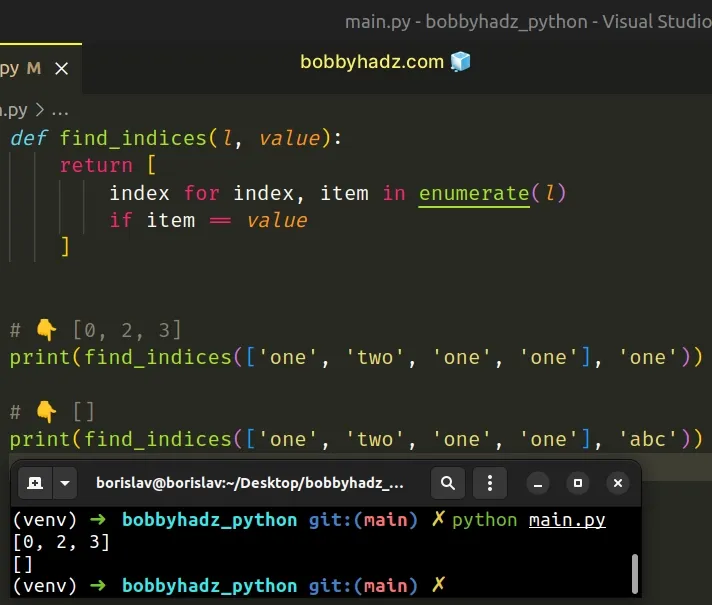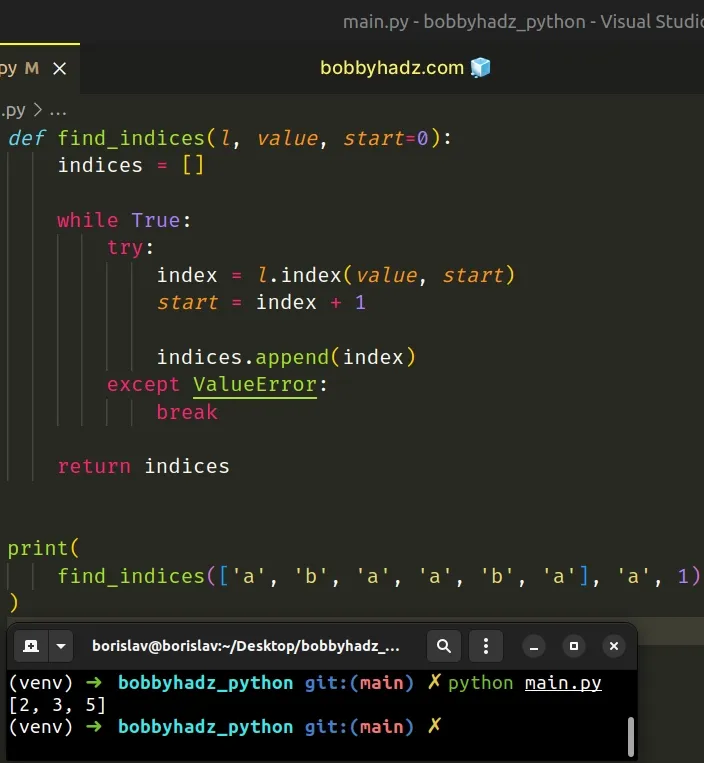Find the indices of duplicate items in a List in Python
Last updated: Apr 10, 2024
Reading time·3 min

# Find the indices of duplicate items in a List in Python
To find the indices of duplicate items in a list:
- Use a list comprehension to iterate over the list with
enumerate(). - Check if each item is equal to the given value.
- Return the index of the matching items.
def find_indices(l, value): return [ index for index, item in enumerate(l) if item == value ] # 👇️ [0, 2, 3] print(find_indices(['one', 'two', 'one', 'one'], 'one')) # 👇️ [] print(find_indices(['one', 'two', 'one', 'one'], 'abc'))

start index, scroll down to the next subheading.We used the enumerate() function to get access to the index of the current
iteration.
The enumerate() function takes an iterable and returns an enumerate object containing tuples where the first element is the index and the second is the corresponding item.
my_list = ['bobby', 'hadz', 'com'] for index, item in enumerate(my_list): print(index, item) # 👉️ 0 bobby, 1 hadz, 2 com
On each iteration, we check if the current item is equal to the given value.
def find_indices(l, value): return [ index for index, item in enumerate(l) if item == value ]
If the condition is met, we return the corresponding index.
The list the function returns contains all indices of the value in the original list.
# Find the indices of duplicate items in a List with start index
If you need to find the indices of the duplicate items in a list with a start index:
- Use a
while Trueloop to iterate until the occurrences of the item are found. - Use the
list.index()method to get the index of each occurrence by specifying astartindex. - Append the matching indices to a new list.
def find_indices(l, value, start=0): indices = [] while True: try: index = l.index(value, start) start = index + 1 indices.append(index) except ValueError: break return indices # 👇️ [2, 3, 5] print(find_indices(['a', 'b', 'a', 'a', 'b', 'a'], 'a', 1)) # 👇️ [3, 5] print(find_indices(['a', 'b', 'a', 'a', 'b', 'a'], 'a', 3)) # 👇️ [5] print(find_indices(['a', 'b', 'a', 'a', 'b', 'a'], 'a', 4)) # 👇️ [] print(find_indices(['a', 'b', 'a', 'a', 'b', 'a'], 'a', 6))

The function takes an optional start index.
The start index is the index at which we start looking for occurrences of the
given value in the list.
The list.index() method returns the index of the first item whose value is
equal to the provided argument.
list.index() method takes an optional `start` argument and starts looking for the specified value from the start index onwards.print(['a', 'b', 'c', 'a'].index('a', 1)) # 👉️ 3
The method raises a ValueError if there is no such item in the list.
If a ValueError is raised, we break out of the while loop and return the
indices list.
def find_indices(l, value, start=0): indices = [] while True: try: index = l.index(value, start) start = index + 1 indices.append(index) except ValueError: break return indices
Otherwise, we increment the start index by 1 and append the index to the
indices list.
The list.append() method adds an item to the end of the list.
# Additional Resources
You can learn more about the related topics by checking out the following tutorials:
- Find common values in multiple Lists in Python
- Find elements in one List that are not in the other (Python)
- Find the index of Elements that meet a condition in Python
- Find Max and Min in List without max() and min() in Python
- Find Min and Max values in Tuple or List of Tuples in Python
- Find the most/least common element in a List in Python
- Find object(s) in a List of objects in Python
- Find second Smallest or Largest number in a List in Python

